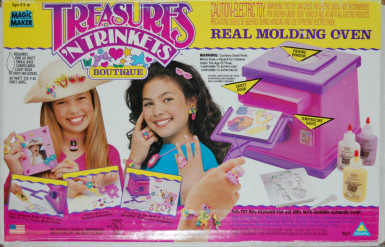 Although Creepy Crawlers were originally produced by Mattel in the 60s by way of the ambiguously named "Thingmaker" toy oven, the product was revived by the Toymax company in the 90s with a (theoretically) less lethal light-bulb powered heater called the Magic Maker. These kits were a kid's dream; like so many of our other beloved 90s toys, they held no underlying value over pure fun and amusement. With the new safety features in place, ToyMax unleashed the retro phenomenon of plasticized bug-making to a new generation.
Although Creepy Crawlers were originally produced by Mattel in the 60s by way of the ambiguously named "Thingmaker" toy oven, the product was revived by the Toymax company in the 90s with a (theoretically) less lethal light-bulb powered heater called the Magic Maker. These kits were a kid's dream; like so many of our other beloved 90s toys, they held no underlying value over pure fun and amusement. With the new safety features in place, ToyMax unleashed the retro phenomenon of plasticized bug-making to a new generation.In reality, the child's role in creating a tray of Creepy Crawlers from a selection of insect molds was relatively limited. The only real decision-making lay in with which colors of Plasti-Goop you would choose to fill the tray. Yes, that's right, Plasti-Goop. The ToyMax 1990s remake retained the 60s terminology for this unknown chemical compound, continuing to cloak the toxicity of these substances in vagueness.
This was the toy for the little boy who desperately yearned to own an easy-bake oven, but was less keen on the public shaming it would bring from his male peers. It possessed similar light-bulb heating technology and yielded tangible goods without forcing boys to don an apron and frost heart-shaped cupcakes. These bug trays were about as macho as it got for the age 6-10 demographic. The aptly named Creepy Crawlers contained die-cast molds in the shape of millipedes, spiders, beetles, horseflies, worms, and all sorts of other creeping insects with that distinctly male appeal.
The major problem with this male-centric toy marketing was that it left us right back where we started. Little girls were no longer satisfied to be banished to their paltry pastry-packing easy-bake ovens. What ToyMax needed was something with some more feminine appeal that required no new technology and a coat of pink and purple paint on the plastic Magic Maker.

I admit as an unauthentic Creepy Crawler enthusiast, this was actually the model I owned. Yes, that's right. The rubberized Plasti-Goop charms on the blond girl's Blossom-esque hat were far more my speed than the decidedly more icky insect version. No longer did I have to stare wistfully at the television every time a creepy crawlers commercial came on, wishing I too could create useless items out of light-bulb cooked Plasti-Goop. They started making Plasti-Goop in all sorts of colors in the pastel family, and all was well in the world again.
Despite these variations, the real seller was the original (well, second generation original) Creepy Crawlers. It even spawned a television cartoon series under the same name, which ran two seasons from 1994-1996. The cartoon was not just based on insects themselves; rather the plot was premised on the actual features of the toy itself. In the Creepy Crawlers television series, a young boy working in a magic shop creates a version of the ToyMax Magic Maker with unfortunate results: mutant "Goopmondo" bug monsters named Hocus Locust, Volt Jolt and T-3. I know, it makes perfect sense. The best part of the show was despite the fact that it was created through a partnership with the ToyMax corporation and used their trademarked devices and terminology, the show rarely used the toy in a fashion anywhere near consistent with the procedures of its real-life counterpart. For example, characters often poured Plasti-Goop directly into the Magic Maker, which may not have caused any significant cartoon damage but certainly would have tragic light-bulb-burn-related consequences in real life. For a toy relaunched on the foundation of its new and improved safety features, ToyMax certainly gave children of the 90s a lot of ideas of how to circumvent the safety precautions.
Thankfully, kids today are not without their own rubbery oven-cooked insect toys. The Jakks Pacific toy company recently took over production of creepy crawlers, which look to be exactly the same as the 1990s version except they slapped a plastic bug on top of the Magic Maker. Very original. However, we can appreciate the suggested uses for Creepy Crawlers as a means of terrorzing your family and making them regretting ever purchasing this overpriced piece of plastic in the first place. Because isn't that truly what it's all about?






0 comments:
Post a Comment